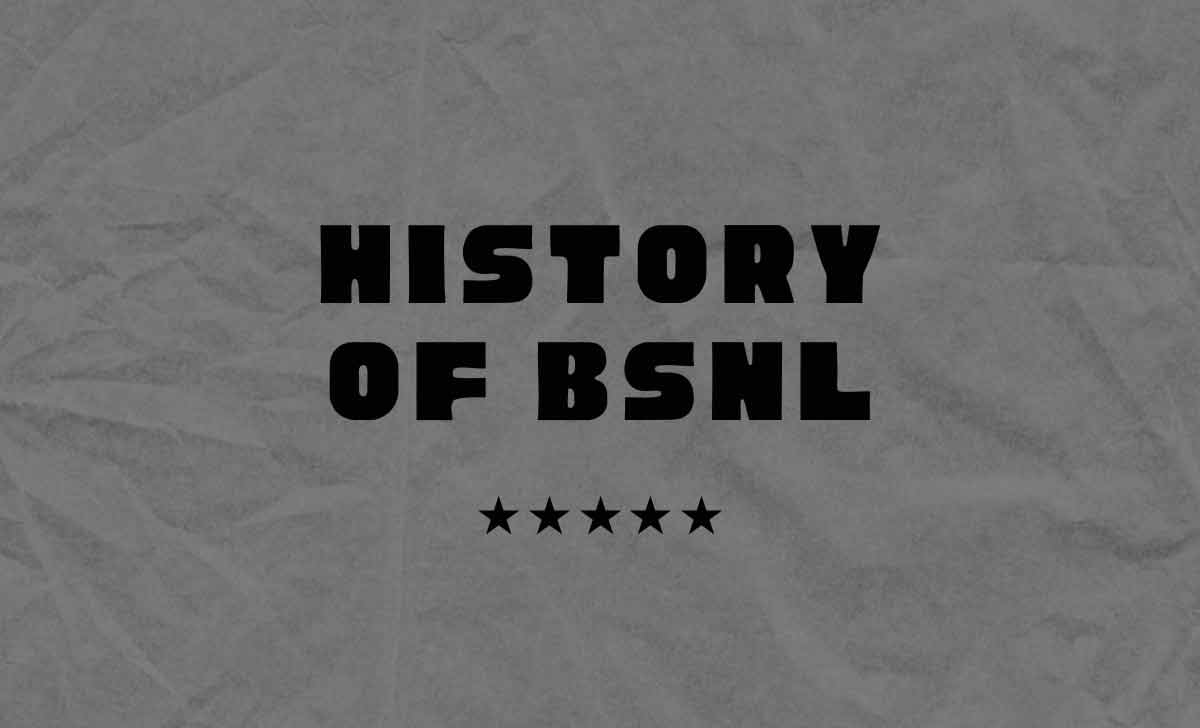PAN India Telecom operator BSNL refers to Bharat Sanchar Nigam Limited, when going to history, it is 100% government owned Communications Corporation, and it is a public telecommunication service in India launched on 15th September 2000 and celebrating the formation day by starting the operations from 01.10.2000 having operational headquarters in New Delhi.
BSNL is India’s oldest communication service provider whose history has a trace back to the British era in the 19th century, and It was the first telegraph line during the British period that got established in 1851, in earlier it was connected to a part of erstwhile Postal and Telegraph Department.
In 1854 the public started accessing the telegraph services, In 1885, The Indian Telegraph Act passed by the British Legislative Counsel, In 1975, it got separated from Postal Telegraph and in 1980’s a telegraph department was created due to the need for telegraph services in the country.

The Government of India made telecom and telegraph services into a corporation in October 2000 and named it Bharat Sanchar Nigam Limited which now operated as a fully owned government public sector in the economy, and after the formation, PSU has run the BSNL telegraph services in India until the facilities were shut down in July 2015 by putting a full stop for Telegram services in history .
Services provided by BSNL
Bharat Sanchar Nigam Limited, one of the Asia’s largest telecommunications company provides a wide variety of telecom services in India, and BSNL becomes a major part with vital role in the communication history as follows
- CDMA Mobile
- Landline Services (Basic Wireline)
- GSM Mobile
- Prepaid
- Postpaid
- GPRS, 2G, 3G and 4G Data Services
- Carrier Services
- BSNL Broadband (DSL and FTTH)
- MPLS VPN
- VSAT
- IN services
- VoIP services (BSNL WINGS)
Installation of the quality network in the country by BSNL is the best service offered to customers in history to every nook and corner of Rural and Urban / Metro cities in India, and the interface is now centering on improving and expanding the network and introducing it in villages to win customers confidence.
Its known as the most extensive network provider and broadband services with more than 60% in the market share and BSNL provides internet access service through dial-up connections as prepaid, Netone at the starting stage and later as BSNL Broadband as DATA ONE, and now moves on to GIGA Speed Fiber to the home network as BSNL FTTH.
Management of BSNL
Bharat Sanchar Nigam Limited has divided entire India into Twenty Four Administrative units and with Two metro districts named as BSNL LSA’s and Telecom Circles, Project cycles, and Five telecom factories, 4 specialized telecom units, 4 maintenance regions, and Three training institutions. Each circle having a head named as Chief General Manager (CGM) and every circle operated with Secondary Switching Areas (SSAs) with SSA heads named PGM/GM.
CMD of BSNL and the Board Members
- Indian Government appointed Dr. D.P.S. Seth, a 1965 batch Indian Telecom Service officer, as first chairman and managing director (CMD) for newly created Bharat Sanchar Nigam limited (BSNL).
- Mr. Rakesh Kumar Upadhyay from 30th April 2011.
- Shri Anupam Shrivastava took over the charge as CMD BSNL from 15th of January 2015 to 30.06.2019.
- Shri. Pravin Kumar PURWAR from 1st July 2019.
Present BSNL Board
At present the BSNL board comprise of 12 Directors, of which 5 are whole time Directors and two Government Nominee Directors and four Non official independent director along with CVO and Company secretary/CGM(Legal), and the present composition of BSNL board is as under
| BSNL Board | Name of Board Member |
|---|---|
| Chairman and Managing Director | Shri. Pravin Kumar PURWAR |
| Director HR | |
| Director Consumer Mobility (CM) | Shri Sheetla Prasad |
| Director Consumer Fixed Access (CFA) | Shri. Vivek Banzal |
| Director Enterprise | Shri. B L Varshney |
| Director Finance | Smt. Yojana Das |
| Govt. Director | Shri Navneet Gupta Joint Secretary(Admn) DoT |
| Shri Abhay Kumar Singh DDG (E&T) DOT | |
| Non Official Independent Director | Smt. Kanuru Sujatha Rao |
| Dr. Santosh R.Dastane | |
| Prof. Jasbir Singh | |
| Shri. V.Venkateshwar Bhat | |
| CVO | Shri H.S.Sohal |
| Company Secretary & CGM (Legal) | Shri H. C. Pant |
BSNL Market Performance
Upto 2009, Bharat Sanchar Nigam Limited, earns a net profit in crores of rupees to Government. Due to unworthful policies and without an approval from government for expansion, in 2009 2010 financial year, BSNL was amongst the loss-making companies. They reported a net loss of Rs. 182.3 Million in 2009 against Rs. 57.5 Million net profit in the previous year.
BSNL mobile usually provides a GSM cellular mobile service under the name Cell one. It offers excellent telecom services to enterprise customers like MPLS, P2P and internet leased lines, and Highly provides fixed line services and a landline that uses CMDA technology and its fiber network, also the performance had increased due to BSNL value-added offers such as Fee phone service, India telephone card, Virtual private network.
It also offered Customers an internet that enabled them to watch televisions and voice through IPTV and the public Sector Enterprise also provides the fastest broadband service to home-based users. In February 2016, BSNL market share was 14.54.AS a wireless provider they were 6th with an 8.16% share in the market.
Reasons for Profit Loss in BSNL and Solutions
BSNL report on their financial loss came up as a big issue which needed resolutions immediately, and the company promised to improve their service and customer interface to eradicate the companies decline. The significant loss had come from failure in the customer service, IT and HR sector hence they had to begin with innovative ideas on how to improve on the same.
Pitfalls got identified from political pressures which included the BSNL tenders and all their prestigious projects getting delayed or canceled, and the company later had to improvise implementation procedures for their expenditures and expenses. The company commenced Retendering, improved efficiency from the top to bottom level employees to turn their company’s losses to profits in the future.
The newspaper and articles took all the information vital to the public. The profit and loss account of 2009 2020 got identified from several communication channels like the newspapers, news, internet in the phone, video conferencing. Published articles and meetings. All these channels identified why the company was lagging through a vast profit and loss analysis. BSNL took note of all methods used and suggested to have a survey done to have a more unobstructed view of the loopholes of the company.
The survey revealed BSNL was delivering poor customer service compared to their competitors, no consideration of existing customers, poor network connectivity in many regions and lack of giving feedback to customers query. And for this, the company had no option than to recruit good candidates who added value to the company in all their departments.
In 2017 a cyber-attack happened which shook South India badly affecting Telkom’s broadband networks. The virus blocked thousands of modems hence the company advised users to change their default router username and passwords.
Conclusion
Many companies have made financial losses due to the problem that arises from the HR and IT department, and it is a clear indication that all departments in an organization are linked to each other which means one issue in a department will spread to all other departments.
BSNL is now commissioning a multi-gigabit multi-protocol, IP infrastructure through the National Internet Backbone that will provide broadband access network, and the broadband service will be seen on digital line technology, which used the old telephone services. The service is going to come with Quality Service Guarantee.
All these developments are a clear indication of the improved performance of the BSNL, It is a clear sign the company is undertaking different methods to tackle their problems, and the objectives, performance issue of the company is repositioning themselves day by day in the market history.
The booming domestic telecom market boasts enormous amounts of investment which will accelerate the entry of new customers in the launch of new services, and the telecommunication sector attracted Foreign Direct Investment, and the company has witnessed merger and acquisition deals that generated huge profits.
The production equipment of ISBL are expected to rise in value if favorable factors like government policies, incentives are given, Talent pool research and development and low labor cost is introduced in the industry.
In this history, now you may know how BSNL is determined to shift from fixed-mobile services, on having a severe competition around telecom operators, entry of foreign players in the industry, the transition from technology-led business to consumer business and improve price competition leading to falling of tariffs, and hence the growth of BSNL which will transform immensely.



